
4-Hydroxy-N,N-diisopropyltryptamine is a synthetic psychedelic drug. It is a higher homologue of psilocin, 4-HO-DET, and is a positional isomer of 4-HO-DPT and has a tryptamine molecular sub-structure.

Diisopropyltryptamine is a psychedelic hallucinogenic drug of the tryptamine family that has a unique effect. While the majority of hallucinogens affect the visual sense, DiPT is primarily aural.

DET, also known under its chemical name N,N-diethyltryptamine and as T-9, is a psychedelic drug closely related to DMT and 4-HO-DET. However, despite its structural similarity to DMT, its activity is induced by an oral dose of around 50–100 mg, without the aid of MAO inhibitors, and the effects last for about 2–4 hours.

5-MeO-MiPT is a psychedelic and hallucinogenic drug, used by some as an entheogen. It has structural and pharmacodynamic properties similar to the drugs 5-MeO-DiPT, DiPT, and MiPT. It is commonly used as a "substitute" for 5-MeO-DiPT because of the very similar structure and effects.

5-MeO-DET or 5-methoxy-N,N-diethyltryptamine is a hallucinogenic tryptamine.

4-HO-MiPT is a synthetic substituted aromatic compound and a lesser-known psychedelic tryptamine. It is thought to be a serotonergic psychedelic, similar to magic mushrooms, LSD and mescaline. Its molecular structure and pharmacological effects somewhat resemble those of the tryptamine psilocin, which is the primary psychoactive chemical in magic mushrooms.

N-Methyl-N-isopropyltryptamine (MiPT) is a psychedelic tryptamine, closely related to DMT, DiPT and Miprocin.

5-MeO-DPT, is a psychedelic and entheogenic designer drug.

EiPT is a chemical in the tryptamine family, and produces psychedelic and hallucinogenic effects. It was probably first synthesized by Alexander Shulgin.

MBT, or N-methyl-N-butyltryptamine, is a lesser-known psychedelic drug. MBT was first synthesized by Alexander Shulgin. In his book TiHKAL, the minimum dosage is listed as 250-400 mg, and the duration listed as 4–6 hours. MBT produces a heavy body load with dehydration, and causes visuals similar to those of DMT. Very little data exists about the pharmacological properties, metabolism, and toxicity of MBT.

4-MeO-MiPT, or 4-methoxy-N-methyl-N-isopropyltryptamine, is a lesser-known psychedelic drug. It is the 4-methoxy analog of MiPT. 4-MeO-MiPT was first synthesized by Alexander Shulgin and is mentioned in his book TiHKAL. Subsequent testing by Shulgin on human test subjects showed the effective dose as 20-30 mg ; the onset time between ingestion and the first noticeable effects was 45-60 min, with sensations lasting between 2-2.5 hours. The sensation were significantly milder than those of 4-HO-MiPT, with 4-MeO-MiPT producing erotic-enhancing effects, and few of the visuals common with tryptamines. Very little data exists about the pharmacological properties, metabolism, and toxicity of 4-MeO-MiPT.
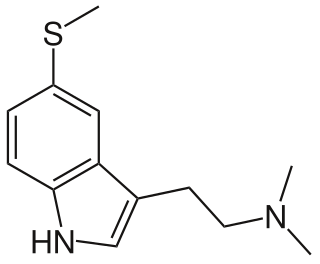
5-MeS-DMT (5-methylthio-N,N-dimethyltryptamine) is a lesser-known psychedelic drug. It is the 5-methylthio analog of dimethyltryptamine (DMT). 5-MeS-DMT was first synthesized by Alexander Shulgin. In his book TiHKAL, the minimum dosage is listed as 15-30 mg. The duration listed as very short, just like DMT. 5-MeS-DMT produces similar effects to DMT, but weaker. Shulgin describes his feelings while on a low dose of this drug as "pointlessly stoned", although at a higher dose of 20 mg he says it is "quite intense" and suggests that a higher dose still might have full activity.
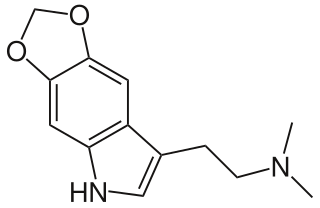
5,6-MDO-DMT, or 5,6-methylenedioxy-N,N-dimethyltryptamine, is a lesser-known psychedelic drug. It is the 5,6-methylenedioxy analog of DMT. 5,6-MDO-DMT was first synthesized by Alexander Shulgin. In his book TiHKAL, 5,6-MDO-DMT produces no noticeable psychoactive effects, although it was only tested up to a dose of 5 mg. Very little data exists about the pharmacological properties, metabolism, and toxicity of 5,6-MDO-DMT.
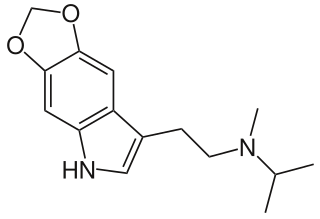
5,6-MDO-MiPT, or 5,6-methylenedioxy-N-methyl-N-isopropyltryptamine, is a lesser-known psychedelic drug. It is the 5,6-methylenedioxy analog of MiPT. 5,6-MDO-MiPT was first synthesized by Alexander Shulgin. In his book TiHKAL, 5,6-MDO-MiPT produces slight paresthesia at low doses. Very little data exists about the pharmacological properties, metabolism, and toxicity of 5,6-MDO-MiPT.

5,6-MeO-MiPT, or 5,6-dimethoxy-N-methyl-N-isopropyltryptamine, is a lesser-known psychedelic drug. It is the 5,6-dimethoxy analog of MiPT. 5,6-MeO-MiPT was first synthesized by Alexander Shulgin. In his book TiHKAL, 5,6-MeO-MiPT produces no noticeable psychoactive effects. Very little data exists about the pharmacological properties, metabolism, and toxicity of 5,6-MeO-MiPT.
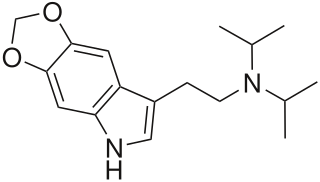
5,6-MDO-DiPT, or 5,6-methylenedioxy-N,N-diisopropyltryptamine, is a lesser-known psychedelic drug. It is the 5,6-methylenedioxy analog of DiPT. 5,6-MDO-DiPT was first synthesized by Alexander Shulgin. It is mentioned in his book TiHKAL, but 5,6-MDO-DiPT was never tested to determine what effects it produces, if any. Very little data exists about the pharmacological properties, metabolism, and toxicity of 5,6-MDO-DiPT.

4,5-MDO-DMT, or 4,5-methylenedioxy-N,N-dimethyltryptamine, is a lesser-known psychedelic drug. It is the 4,5-methylenedioxy analog of DMT. 4,5-MDO-DMT was first synthesized by Alexander Shulgin, though in his book TiHKAL it was not tested to determine its psychoactive effects. 4,5-MDO-DMT has been the subject of limited subsequent testing; with behavioral disruption studies performed in male rats indicating that its hallucinogenic potency is less than that of 4,5-MDO-DiPT but greater than that of 5,6-MDO-DiPT.
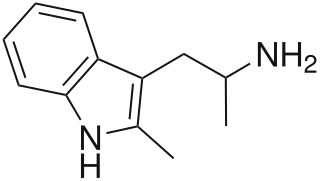
2,α-Dimethyltryptamine (2,α-DMT) is a tryptamine and a lesser-known psychedelic drug. It is the 2,α-dimethyl analog of DMT. Its synthesis was first reported in 1965. Alexander Shulgin lists the dosage as 300-500 mg, and the duration as 7–10 hours in his book TiHKAL. 2,α-DMT causes mydriasis and paresthesia. It also produces a calm, drunk-like feeling. Very little data exists about the pharmacological properties, metabolism, and toxicity of 2,α-DMT.
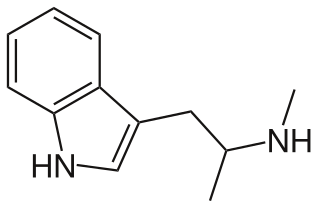
Alpha,N-DMT, or α,N-dimethyltryptamine, is a lesser-known psychedelic drug. It is the α,N-dimethyl analog of DMT. α,N-DMT was first synthesized by Alexander Shulgin. In his book TiHKAL, Shulgin lists the dosage as 50-100 mg, and the duration as 6–8 hours. α,N-DMT causes an unpleasant body load. Very little data exists about the pharmacological properties, metabolism, and toxicity of α,N-DMT.



















